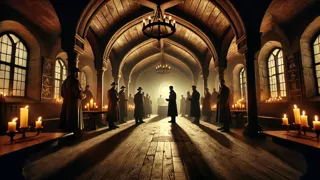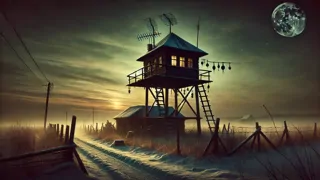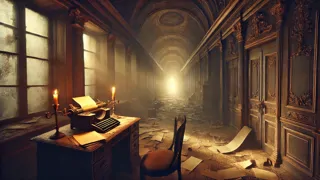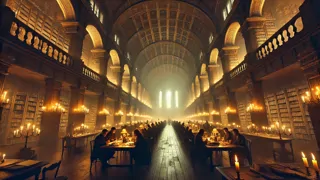Introduction
Petrograd, spring of 1917. Even as soldiers mutter of war weariness in frost-chilled trenches outside the city walls, an unseen council convened behind the battered doors of a clandestine library. American intelligence officers, dispatched under false identities, perched at heavy oak tables, quill in hand. Their purpose: to record every utterance of the Tsarist surveillance apparatus as it fused with Slavic folk magic. A hush fell over the vaulted room when Ivan Drapov, the Okhrana’s occult liaison, recited the minutes of the last meeting. In low tones, he recounted the summoning of domovy spirits to guard secret files, the binding of rusa´lka to maritime patrols, and the strategic placement of patron saint effigies in winter-blasted hamlets. Outside, Petrograd’s gaslit streets seemed to hold their breath, as if aware that these records might reshape history itself. Every candle flicker cast dancing shadows on aging manuscripts, and every distant whistle of a passing train reminded the scribes of a world teetering between empire and revolution. It was a moment suspended in time: an intersection of politics, folklore, and espionage. Yet, as the final lines were inked on parchment, no one grasped that this single transcript—Minutes of the Last Meeting—would become the most coveted document in an age when truth was as elusive as the spirits it described.
Summons and Surveillance
In the dimly lit vault beneath the Great Hermitage Museum, oak panels creaked under unseen weight as Captains Lydia Harper and Alexei Morozov prepared their quills. Lamp flames trembled, casting flickering halos on vellum sheets that would bear the account of events too strange for official archives. Beyond the heavy door, Tsarist sentries paced along the marble corridor, escorting a silent figure whose presence seemed to warp the air itself. He was Ivan Drapov, the Okhrana’s clandestine occult liaison, robed in tar-black wool embroidered with crimson sigils. Before him, Harper’s sapphire eyes narrowed as she observed his cracked and trembling hands. She knew that within those joints lay bound secrets older than the Romanovs. Morozov, whose scarred fingers still bore ghostly traces of ink from previous missions, offered a low bow. “Begin,” he whispered, voice taut with gravity. A hush fell over the council participants as Drapov opened his leather-bound codex. A single coil of golden ribbon slipped from its binding like a serpent stirring in its nest. Even the rats nesting behind the panel walls seemed to still their scutter. This was no ordinary gathering of spymasters. Here, at the intersection of politics and ancient rite, they summoned Slavic guardians to secure the Empire’s fragile secrets. Each incantation, patterned on the ancient runes of the domovy, resonated with subterranean rhythms that pulsed beneath their blood. Harper pressed her quill to parchment, determined that no whispered syllable—no flicker of candlelight—should escape unrecorded. Some conspirators whispered that each conjuration etched unseen channels into the earth itself, mapping ley lines that fed on human conflict. Harper felt both awe and dread at the thought that their impartial record might one day trigger those subterranean currents.

Daylight in Petrograd had already surrendered to a soot-smudged dusk when the telegraph room at the Ministry of Communication buzzed with uneasy energy. Long strands of telegraph wire, slick with dampness from the Neva’s mist, snaked across benches like coiled serpents awaiting release. Under Harper’s careful gaze, Morozov affixed parish votives carved from bone to each wooden support beam. He whispered a hallowed prayer to invoke protective rusalki, weaving holy water and Pfennig coins into the ritual. Drapov stood on a raised dais, tracing arcane glyphs in the air with a silver dagger. Each slash cut through the stale atmosphere, releasing a trembling resonance that sent shivers down every spine in the vaulted chamber. Invisible watchers, they believed, drifted above like restless wraiths, feeding on the dissonance of mortal fear. Outside, donkey carts trundled over cobblestones coated in ash and falling snow, oblivious to the alchemy unfolding within. Lanterns buzzed under the weight of too many eyes—Okhrana informers perched on rafters, hidden behind iron-grilled windows. Every code tapped out on brass keys was an invitation to those unseen spirits, each bit of Morse code a summons to bind living flesh to the silent watchers. The air smelled of melting tallow and unspoken dread as magic and machinery converged on the same iron table. Even the telephones lining the marble walls, prized relics from a recent Russian-American exchange, seemed to hum with anticipation. In the margins of rough drafts, functionaries doodled sigils of uncertain origin, as if drawn by an unseen hand. Outside laughter echoed faintly down flagged alleys, a cruel reminder that life persisted unknowing above such arcane collusion. The Ministry’s heavy shutters rattled in a distant gale, as though the storm itself sought entry to witness their deeds.
As hours melted into dawn, the catalogued minutes grew into a labyrinthine tapestry of conspiracy and enchantment. Harper’s wrist smarted from endless script, but she dared not relent, for each stroke of ink sealed the very destiny of the empire. Drapov’s voice, once taut and crackling with arcane resonance, softened into whispered confidences when he spoke of the Northern Lights stirring over desolate fields. He confessed that the domovy, though steadfast household protectors, sometimes hungered for change, thirsting instead for the catastrophic tang of human conflict. Officials believed they could tame these entities with barbed wire and ciphered telegrams, but the pages filled with warning. Morozov felt a chill braid itself into his spine when Drapov described a ritual binding that had snapped, its runaway energy scorching a remote guardhouse on the southern border. That incident, they concluded, had silenced the most vaunted Russian cavalry, leaving only smoldering footprints in the tundra. The council members shifted uneasily as a sudden draft quivered through the room, though no window lay open. Lamps guttered in their iron sconces, casting skeletal silhouettes that danced across the coffered ceiling. A distant owl hooted in protest, its lament reverberating through hollow corridors of power. Harper paused and lifted her gaze, sensing the otherworldly watchers closing in. The final lines of that segment described the desperate cry of a soldier trapped in a ghostly realm, his voice carrying on peeling paper like a solemn oath. Between every line of scripture and intelligence code lay traces of soot and salt, tangible proof of man’s dual hunger for secrecy and salvation. The codex’s spine creaked with the weight of stories that would remain hidden for generations. None among the scribes could foresee which chapter might unleash the most devastating consequences.
Echoes in the Watchtower
In the heart of a frost-choked forest on the outskirts of Tsarskoye Selo, a solitary watchtower rose like a specter against the iron-gray sky. Elmwood beams, aged by centuries of northern winters, groaned under the weight of heavy snow that clung to each weathered plank. Captain Harper and Morozov, cloaked in seal-skin coats, approached without uttering a word, their breath trailing luminous vapors in the dim lantern light. Inside, a solitary Okhrana sentry lounged against a narrow ladder leading to the tower’s peak, his sharp eyes reflecting the glow of a single carbide lamp. Underneath that cold flame, ragged journals lay open, filled with cryptic sketches of domovy and whispered transcripts written in a hurried scrawl. Morozov placed a tiny phonograph recorder on the sill, its brass horn aimed toward the belly of the tower. He pressed a hidden trigger, capturing every creak and distant thunderclap that reverberated through its timbers. Harper slipped her hand inside her coat and retrieved a leather-bound notebook, its front cover embossed with an American eagle and Cyrillic script. She flipped through pages dense with marginalia: references to subterranean spirits, annotations on spectral interference with telegraph signals, and hastily drawn warding seals. The sentry, sensing their presence before the first syllable crossed his lips, cocked his rifle and glared with equal parts curiosity and alarm. Drapov’s summons had attracted not only folkloric guardians, but eavesdroppers from every corner of the Empire. A hush fell over the small chamber as the wind howled through tiny gaps in the wooden planks. Shadows lengthened, seeming to detach from their owners and dance across the rough-hewn floorboards. An unseen breeze rustled the crackling pages of hundreds of confidential dispatches, each promising revelation or ruin. Harper rummaged for her pen, ready to transcribe any utterance—even if it emanated from beyond the veil of mortality. Outside, the forest roiled, and distant voices—half-remembered lullabies sung in ancient dialects—floated on the air. Morozov leaned forward, adjusting the recorder’s idler wheel as the first faint murmur emerged: a child’s laughter rippling with the sadness of forgotten winters.

By the time Harper’s quill scraped across the page for the hundredth time, dusk had given way to a moonless night so black it seemed to swallow sound itself. Morozov switched on a faint gas lamp, its sickly green flame revealing the swirling vapor that drifted through the rafters in lazy eddies. He wiped sweat from his brow despite the biting cold, wondering if those vapors carried the essence of the rusa´lka rumored to haunt the Neva’s hidden waterways. In the distance, a faint whistle echoed—an encoded signal from a government cryptographer stationed miles away in St. Petersburg. Those clicks, encoded in a variant of Baudot code, served as both a summons and a veiled threat: the Okhrana’s confidence would not tolerate leaks. Inside, the walls exhaled memories of clandestine interrogations, their plaster-smooth facings etched by generations of desperate fingers. Harper bent low to trace the calligraphic arc of a warding rune left by her predecessor, a Czech medium captured during the previous winter. That rune pulsed with a faint violet glow, so subtle it risked detection only by the most sensitive instruments. Morozov placed the recorder’s horn next to the rune’s edge, intending to capture every spectral vibration that might pass through iron and wood. An otherworldly hum rose, discordant and fragile, as if reality itself quivered in response. Harper’s hand froze over parchment as the overlapped sound of shuffling awareness began to emerge: distant boots crunching on glassy ice, hushed prayers murmured in Ancient Church Slavonic. She struck her quill anew, her pen dancing across margins to annotate phonetic nuances that defied classical linguistics. Time rippled unevenly, for in that watchtower, mortal and spirit realms brushed shoulders like unwanted guests at a sooty banquet. The Okhrana’s highest council would soon peruse these lines, adjusting security protocols based on revelations they were never meant to possess. Morozov swallowed hard when he realized he had recorded not one voice, but a chorus—an elegy of lost souls bound to surveillance and duty. Each stanza in the wind carried the hitched cadence of mythic oaths, promising retribution if the pact was broken. Harper exchanged a glance with him, their unspoken conviction mirrored in flickering gaslight. They would see these whispers through to ink, no matter what cost might follow.
As dawn bled into the eastern sky, the watchtower’s heavy door creaked open, revealing Harper and Morozov bloodstained and weary from the night’s toil. Bits of parchment littered the floor like fallen leaves, each scrap bearing fragments of prophecy and classified telegrams. They gathered the papers in trembling hands, aware that misplacement could unleash chaos across every garrison of the Tsarist regime. Drapov’s ritual had afoot an unintended transmission of power—spirits bound to the rubicon of state secrets now roamed freely, drawn to the scent of unguarded whispers. A single, fractured mirage of a domovy materialized on the stairwell, its ember-red eyes reflecting the agony of centuries spent protecting indifferent households. Morozov’s heart pounded as he remembered the final summoning, when a low chant had shattered the silence like glass. Harper secured the codex inside her coat, fastening brass clasps over wards she had improvised in haste. With every breath, she tasted a metallic tang, as if ink itself had coated her lungs. Outside, the forest’s hush swallowed the weight of their clandestine ledger, as quartermaster cries and the distant rumble of artillery grew louder toward the front. They knew the moment their record reached Peterhof’s high council, doctrine would twist to harness these spectral actors in service of imperial ambition. Yet in their bones, they feared it would be the empire that bowed before powers it no longer understood. The final passage—chiseled with the failings of mortal conviction—warned of a reckoning, one that would outlast dynasties and track every secret soul into darkness. Morozov nearly dropped his pen when Harper read aloud lines that described the shattering of a ceremonial mirror, its shards scattered across a field and charged with malignant resonance. Those fragments, she intoned, could reiterate any message carried on the wind, rewriting reality itself. The watchtower’s windows rattled as if in protest, and a sudden gust snuffed out the last lamp flame. They stumbled outside, stepping through snow crusted with ghostly footprints leading deeper into the forest’s belly. Somewhere beyond the pines, a hush agreed that some whispers should never be recorded, yet here they stood, unwilling scribes to the impossible.
Ink and Ashes
Three nights later, the clandestine meeting reconvened beneath a full moon that bathed the frozen courtyard in ghostly silver. Harper and Morozov met with Elena Petrova, a daring editor from a clandestine press sympathetic to revolutionary causes. They chose the Winter Palace’s neglected guest wing, its windows boarded and corridors suffocated by decades of imperial secrets. Within that hollowed wing, high ceilings arched like a cathedral abandoned by its congregation, and the marble floor gleamed with the sheen of bitter cold. Drapov awaited them beside an antique writing desk carved from linden wood, its surface scarred by countless quills and inkwells. Elena extracted a stack of vellum sheets bound by crimson ribbon, her hands trembling as if she held a fragile heart. Outside, armed patrols passed beneath arched colonnades, their heavy boots muffled by crusted snow. Inside, lamp light flickered, casting wavering shadows across peeling frescoes of Romanov triumphs. Drapov announced that this final segment would consolidate every fragment of conjuration and cipher into a single illuminated manuscript. He recited the arcane incantation that would bind rusa´lka, domovy, and Okhrana informers alike into a covenant overseen by the Tsar’s own shadow. Harper traced each line in her journal, pausing only to note sigils that might serve as both safeguard and weapon. Morozov, his breath frosting the ivory pages, inserted marginal warnings that warned revolutionaries not to treat these words lightly. Elena’s voice quivered when she spoke aloud passages meant to expose the surveillance network’s deepest vulnerabilities. A low rumble felt beneath their feet, as if the palace itself recoiled at the weight of such forbidden knowledge. The air smelled of old paper, gunmetal, and the faint, acrid tang of nightmares half-remembered. Drapov sealed the codex with a wisp of enchanted smoke that shimmered like a prism across ink-black parchment. The library’s vaulted arches seemed to sigh with relief—or perhaps regret—as the final contract of power and prophecy was completed. Together, the three conspirators recognized that the true reckoning lay not in the words inked here, but in the ashes of both empire and rebellion that would follow.

Clutching the completed manuscript, Harper concealed it within her coat beneath layers of fur and linen, while Morozov wrapped Elena’s parcel with a layer of protective wards. At the Nevsky Prospekt train station, tickets were exchanged in a swirl of heat and frigid wind, each traveler a potential informant or spirit in disguise. They boarded a cramped carriage bound for Finland, its wood-paneled walls resonating with the rhythmic clatter that felt like a homemade lullaby for restless souls. Inside, railway guards patrolled with lamplight in one hand and rifle in the other, their eyes darting like wary foxes hunting through the gloom. Elena leaned across the berth to press a folded note into a sympathetic telegraph clerk’s palm—a desperate plea to deliver the codex to safe hands abroad. Outside the window, the endless ribbons of track sprawled across frozen marshes, illuminated by the fleeting glimmer of incendiary shells in distant skirmishes. Harper recalled Drapov’s warning of a domovy’s hunger—his cryptic prophecy that the spirits bound within the codex would seek to rewrite their own fates once freed from parchment. She shuddered as she thought of the guardhouse inferno from the southern border, where brass debris and bottled illusions had fallen together in a blinding storm of combustion. Morozov whispered ancient verses under his breath, hoping to soothe any restless echoes bound to ride the train’s shadows. Elena’s heart pounded when she glimpsed a childhood lullaby scratched on the battered bench—a sign she believed meant the rusa´lka were among their ranks. A low whistle rose above the wheels’ clamor, as if the spirits themselves called them forward into unknown dangers. Each mile carried them farther from imperial authority, yet closer to the ever-watchful gaze of revolutionaries hungry for power. They passed frozen canals where blackened reeds bent in mournful protest. A sudden jolt jolted the carriage, sending candles crashing and splintering glass like shattered dreams. Harper’s quill, hidden in a hollowed comb, trembled as she prepared final dispositions in case the codex was seized. Morozov clung to the weight of the manuscript against his chest, determined that no flame or cipher could reduce its contents to ash. Outside the night claimed the train, and within, four souls exchanged silent vows to protect what they had unleashed in ink and prayer.
Arriving under the gray haze of dawn at Helsinki harbor, they transferred the codex to a waiting launch bound for neutral Sweden and onward to the American consulate in Copenhagen. A small cutter slipped across choppy Baltic waves, its prow cutting through frigid spray like a fragile promise of hope and ruin. Harper watched as distant silhouettes of pine ridges retreated into mist, mindful that each ebbing shore moved them deeper into realms beyond the Tsar’s reach. Morozov kept vigil over the vessel’s hold, where the codex lay swaddled in occult wards and silver-burnished tin. Elena paced the deck, recalling that the final meeting’s minutes had predicted an awakening—one that would cross continents and shatter the complacency of both empire and revolution. Once in Copenhagen, an American diplomat named Charles Davenport received the codebook in a smoked glass portfolio, his features drawn with cautious reverence. Davenport studied its pages by gas lamp, fingers stained with midnight-blue ink and ancient oil from the binding. He noted how descriptions of spectral interference mapped uncanny parallels to reports of phantom transmissions over American radio waves. Harper and Morozov learned that intelligence agencies across the globe were already retooling protocols to guard against mystical incursions. The codex’s margins glowed faintly, as if eager to share every secret with a new audience. Elena proposed a classified publication that would circulate among vetted scholars, ensuring the text’s dual authority in history and folklore. Davenport smiled, knowing how history bent under the weight of a single clandestine record. If the next war relied on unseen alliances as much as human armies, then these minutes might prove the ultimate battalion. Harper inhaled the scent of damp paper and distant gunpowder, sensing that their journey had only just begun. Morozov pressed his hand to the leather-bound cover, feeling a soft tremor course through its embossed runes. They had inked their names among the first scribes to bridge mortal and immortal realms. As the sunrise painted the harbor rose and gold, they sealed their covenant in silence, grains of ash and hope swirling together in unseen vortices of power. And so ended the chronicle of ink and ashes: a testament that some truths refuse to remain buried beneath snow or tyranny.
Conclusion
In the months that followed, the ‘Minutes of the Last Meeting’ circulated quietly among disparate circles—military strategists, occult scholars and underground revolutionaries alike. Each reading unraveled fresh layers of conspiracy and enchantment, revealing how deeply folklore was woven into the machinery of surveillance. Some claimed the domovy had whispered directives that reshaped skirmish lines, while others insisted rusa´lka sightings signaled covert smuggling routes. Whether the transcripts sparked salvation or calamity, none could deny their power to blur the line between myth and statecraft. The codex endured beyond empires, surviving clandestine fires and shifting borders, carried by those who believed knowledge was the gravest weapon of all. Today, fragments of its original vellum rest in archives under lock and key, dainty warding wards waiting for curious scholars to awaken dormant echoes. Yet even as historians debate the veracity of each marginal note, a hushed question lingers at every symposium and candlelit study: what might be unleashed when inked oaths are granted the breath of ghosts? In that question, the true legacy of the last meeting remains forever alive, resisting every effort to consign it to the silent dust of history.

















